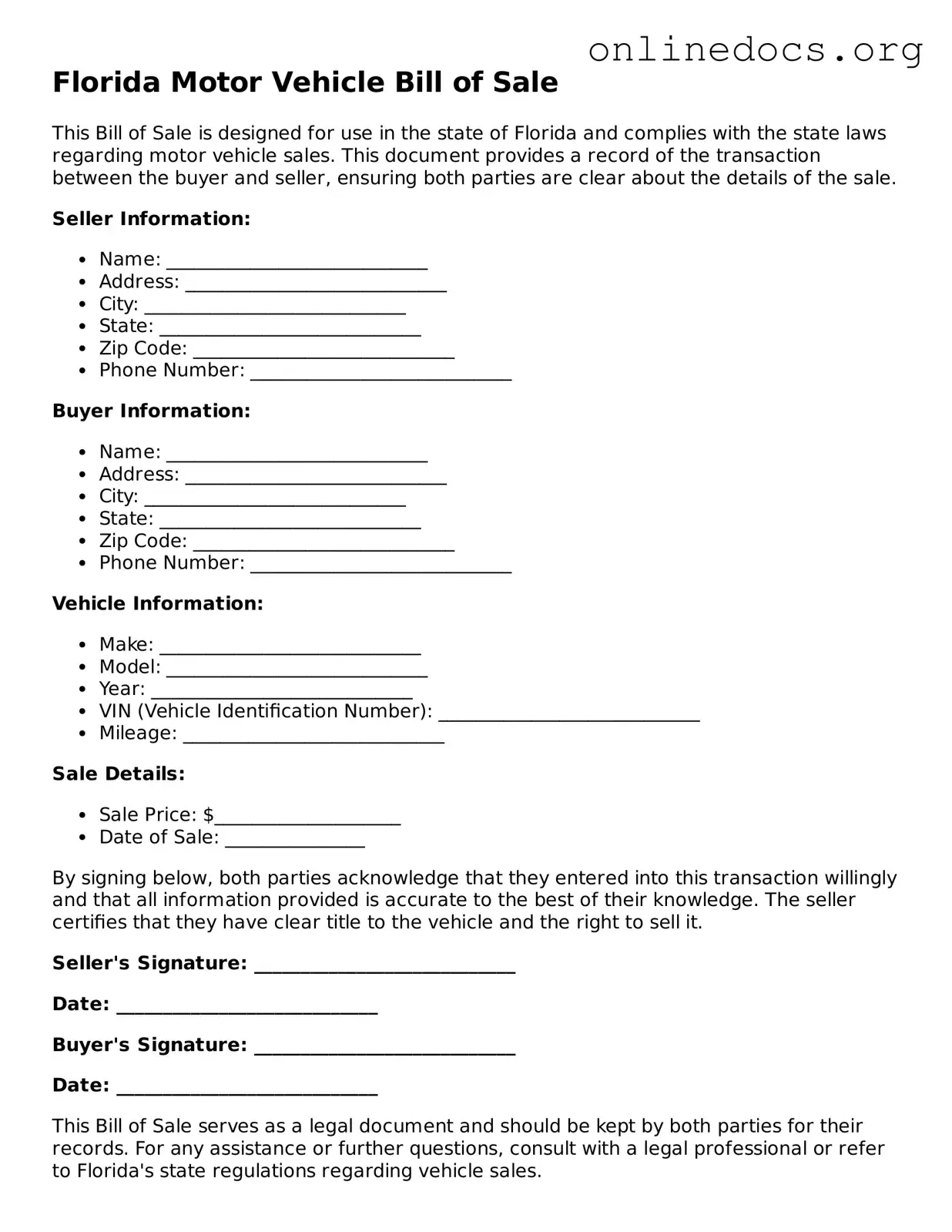The Florida Motor Vehicle Bill of Sale form shares similarities with the general Bill of Sale, which is a document used in many states to transfer ownership of personal property. Like the Motor Vehicle Bill of Sale, a general Bill of Sale includes details about the buyer and seller, a description of the item being sold, and the sale price. Both documents serve as proof of the transaction and can protect the interests of both parties in case of disputes. Additionally, they may require signatures from both parties to validate the agreement.
Another document akin to the Florida Motor Vehicle Bill of Sale is the Vehicle Title Transfer form. This form is essential for legally transferring ownership of a vehicle from one party to another. Similar to the Bill of Sale, it includes information about the buyer and seller, as well as vehicle identification details. However, the Vehicle Title Transfer form is specifically focused on the title itself, which must be updated with the new owner's information to ensure proper registration and avoid potential legal issues.
The Odometer Disclosure Statement is also comparable to the Florida Motor Vehicle Bill of Sale. This document is required when selling a vehicle to disclose the mileage at the time of sale. Like the Bill of Sale, it aims to protect buyers by ensuring they are informed about the vehicle's condition. Both documents require signatures and may be submitted to the Department of Motor Vehicles (DMV) to complete the sale process legally.
When dealing with various types of sales, such as those involving vehicles or personal property, using the correct documentation is vital. In California, for instance, utilizing a proper Bill of Sale ensures a smooth transaction and protects the interests of both parties involved. For those looking for templates to guide them through the process, resources like All Templates PDF can be incredibly helpful, offering forms that cater to different types of transactions.
The Purchase Agreement for a Vehicle is another document that resembles the Florida Motor Vehicle Bill of Sale. This agreement outlines the terms of the sale, including the price, payment method, and any warranties or conditions. While the Bill of Sale serves as proof of the transaction, the Purchase Agreement details the obligations of both parties. Both documents are important for ensuring a clear understanding of the sale and can be used in case of disputes.
The Affidavit of Heirship can also be likened to the Florida Motor Vehicle Bill of Sale, particularly in cases where a vehicle is transferred as part of an estate. This document verifies the identity of heirs and their right to inherit property, including vehicles. Similar to the Bill of Sale, it requires signatures and may need to be notarized to be considered valid. Both documents help establish legal ownership and facilitate the transfer process.
The DMV Application for Title is another document that shares similarities with the Florida Motor Vehicle Bill of Sale. This application is necessary for obtaining a new title after purchasing a vehicle. It collects information about the buyer and seller, as well as vehicle details, much like the Bill of Sale. Both documents are crucial for ensuring that the new owner can register the vehicle legally and avoid complications with ownership verification.
Lastly, the Vehicle Registration Application is similar to the Florida Motor Vehicle Bill of Sale in that it is often completed during the ownership transfer process. This application is used to register the vehicle in the new owner's name and requires information about the buyer, seller, and vehicle. Both documents work together to ensure that the transaction is properly recorded with the DMV, thereby providing legal recognition of the new ownership.
